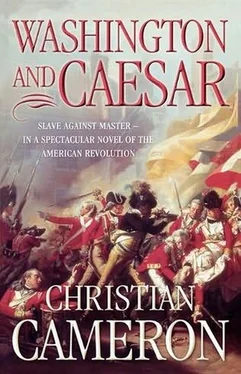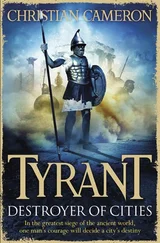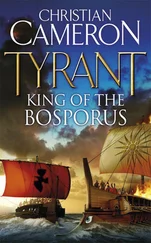Christian Cameron - Washington and Caesar
Здесь есть возможность читать онлайн «Christian Cameron - Washington and Caesar» — ознакомительный отрывок электронной книги совершенно бесплатно, а после прочтения отрывка купить полную версию. В некоторых случаях можно слушать аудио, скачать через торрент в формате fb2 и присутствует краткое содержание. Год выпуска: 0101, ISBN: 0101, Издательство: HarperCollins, Жанр: Исторические приключения, на английском языке. Описание произведения, (предисловие) а так же отзывы посетителей доступны на портале библиотеки ЛибКат.
- Название:Washington and Caesar
- Автор:
- Издательство:HarperCollins
- Жанр:
- Год:0101
- ISBN:9780007389698
- Рейтинг книги:3 / 5. Голосов: 1
-
Избранное:Добавить в избранное
- Отзывы:
-
Ваша оценка:
- 60
- 1
- 2
- 3
- 4
- 5
Washington and Caesar: краткое содержание, описание и аннотация
Предлагаем к чтению аннотацию, описание, краткое содержание или предисловие (зависит от того, что написал сам автор книги «Washington and Caesar»). Если вы не нашли необходимую информацию о книге — напишите в комментариях, мы постараемся отыскать её.
Washington and Caesar — читать онлайн ознакомительный отрывок
Ниже представлен текст книги, разбитый по страницам. Система сохранения места последней прочитанной страницы, позволяет с удобством читать онлайн бесплатно книгу «Washington and Caesar», без необходимости каждый раз заново искать на чём Вы остановились. Поставьте закладку, и сможете в любой момент перейти на страницу, на которой закончили чтение.
Интервал:
Закладка:
He had some distant notion of hiding. Indeed, he had little expectation of anything after he reached the water. But it was so cold that it seemed to wake him up and charge him with energy, and he swam out into the deepest part, where they bathed, and then across toward the green scum where the big fish and the biggest frogs lived on the far side.
Virgil heard the shots and knew he was too late, but he didn’t slow himself, bursting into the edge of the camp only a few moments after the first flurry of fire. He couldn’t tell, as Caesar could, the different pieces by their different sounds, but he was unsurprised to find Lolly lying dead in a vast pool of blood, his gut shot and a small hole in the middle of his face, right at the top of his nose. The back of his head was all over the inside of their little wigwam. His eyes were wide open. It might have made Virgil sick, but he was too angry, and he blamed himself. He ran on. Old Ben lay in the clearing, the old fowler fallen beside
him. He was mewling like a kitten, making pitiful noises every time he exhaled. Both hands clutched at his belly, which was caked in mud and blood and something worse, something gray that was leaking out of him. He didn’t scream. He just lay and made that dreadful noise. Virgil paused and looked at him, and then reached down and stripped the little pouch and horn for the fowler over the old man’s head. Old Ben didn’t resist, but he didn’t seem to know what was happening, either, and he let out a mournful sound when Virgil rolled him back on his side. Virgil tried to be gentle, but he knew he was hurting the old man by the time he got the powder horn. It had to be done.
He picked up the fowler and moved along the trail where, apparently, Ben had fallen while the others ran. The whites must be right on them, although the forest was somehow quieter. He moved to the edge of the camp and took shelter in the shadow of a giant tree, and elected to wait. He had learned this while hunting with Caesar: when you don’t know exactly what your quarry is doing, be silent and wait.
Something moved in the deepest part of the river, but he didn’t pay it much mind. Twice he heard voices, softly, but the day was fading fast and nothing seemed to get any closer to him, and then, suddenly, they were both in the clearing, and Virgil realized that it was much darker than he had thought.
“That thin boy crawled away.”
“No mattuh, Weymes. We kilt the old man with the gun. We’ll claim his bounty an’ the younguh one, too. We got the one I caught.” He laughed. “If’n they was all this easy, this would be a good an’ godly way to live, Weymes. Wheah’d you leave the one you tied?”
“Up the trail. Come on, Mr. Bludner. If you don’ min’ the swamp in the dark, I do.”
“I don’ think of you as a delicate flowuh, Brother Weymes.” The taller of the two men bent over Old Ben and cut his throat, then cut the whole top of the skin of his head away. The shorter man did the same to Lolly. Ben’s little moans had stopped some time since, and Virgil told himself that the poor man had been dead before his throat was cut, but the image of the act stayed with Virgil for the rest of his life.
Virgil thought of shooting at them, there and then, but they had the boy, Jim, and only they knew where he was. Virgil waited some more and followed the two white men when they started back. It was several miles, and they set a fast pace, clearly unconcerned with pursuit. Their contempt for any opposition from the black men burned Virgil like fire. He knew he was responsible for Ben’s death and Lolly’s, and he flamed with desire for revenge, expiation and freedom from the knowledge that he had killed his friends-perhaps killed them all.
He padded down the trail and thought about death.
He might have run right on them and died, he was so lost inside his own guilt. Then the sounds of the swamp changed, a subtle change, more of a lack than a presence, but Virgil felt it and he stopped, disoriented, and listened to the silence. A crow cawed away in front of him. Something had spooked the crow and everything else.
Ahead of him, Jim began to cry out in pain. Virgil was determined not to lose the boy, and he pressed on, no slower but with his attention focused on the task at hand. He saw a flicker of white among the trees, and then another. One of the men was in a shirt and the pale linen gave him away. They were stopped by a tree on the trail.
They were cutting the boy down from the tree.
He was almost on them; the boy was there, and his heart rose.
Virgil didn’t hesitate, or plan. He ran down the trail-better trampled today than ever before-until he came to the little space where it crossed two tiny streams in a dozen feet. The two whites and the boy were just beyond the streams, where the boy had been tied tightly to a swamp oak. His returning circulation caused him to flop on the ground with more force than he could have used in full control of his limbs, and for a moment he was free of his captors, though too far gone to help himself. He rolled and spasmed, the agony of the returning blood more powerful than any desire to run.
When Virgil was just a few feet from the taller man, whom Virgil had marked as the more dangerous, the man looked up and bellowed a warning. He tried to lever himself up from the crouch he was in and move back off the trail, but fell backwards, helpless and off balance. Virgil snapped his pistol in the big man’s face, and the prime flashed, but the barrel didn’t fire. Virgil kicked the man as hard as he could and whirled, dropping the pistol and looking for the little man, who was pointing a rifle at him a few feet away in the soft moonlight and smiling. The smile died as the man realized that his rifle was uncocked-that he had made a fool’s mistake and not reloaded after the last shot. Virgil’s fowler was loaded with shot, and the shot flew a little high in Virgil’s inexperienced hands, ripping into the man’s face and hands. He screamed, but he was not new to pain, and even as he fell he reached in his hunting pouch for a pistol. Virgil, his mind suddenly clear of doubt and his actions written out for him like morning orders, held the fowler, picked up the pistol he had dropped, plucked the crippled boy off the trail and ran into the dark. A shot barked at them, and then another, but Virgil clutched his precious burdens and ran.
Boston, October 1775
Washington sat atop his charger, his heavy greatcoat bundled about his ears, and regarded Boston through Charles Lee’s new Dollond telescope. It was a beautiful thing: wooden barrel twenty inches long and a fast resolution in the hand. Washington hadn’t owned a glass in the Pennsylvania wars. Truth to tell, there had seldom been a vista long enough to use one, through all the trees. This was a different type of warfare, a slow siege where logistics would matter more than tactics. Washington had the patience for a siege, and he wanted the time to train his army.
Incongruous thoughts of the season wouldn’t leave his head this morning. He wondered if either of his farms had managed a winter crop of wheat; he longed for a report from his manager. He thought of his farms every day and wrote advice to his overseers whenever he could.
Below him, spread like a printer’s study of an untidy siege, were the British lines; closer in, his own lines, stronger than they had been. The sentries, long-suffering militia or temporary “regulars”, had blankets, and one lucky fellow a watch coat. Watch coats were the proper military garments for winter sentries; they were coming, slowly, from Philadelphia. Washington centered his telescope on the three figures. One man was quite old; the other two were prime. They all had cartridge boxes. Washington smiled grimly. He would be lucky if they had ten rounds a man. Powder was still the critical element.
Читать дальшеИнтервал:
Закладка:
Похожие книги на «Washington and Caesar»
Представляем Вашему вниманию похожие книги на «Washington and Caesar» списком для выбора. Мы отобрали схожую по названию и смыслу литературу в надежде предоставить читателям больше вариантов отыскать новые, интересные, ещё непрочитанные произведения.
Обсуждение, отзывы о книге «Washington and Caesar» и просто собственные мнения читателей. Оставьте ваши комментарии, напишите, что Вы думаете о произведении, его смысле или главных героях. Укажите что конкретно понравилось, а что нет, и почему Вы так считаете.












